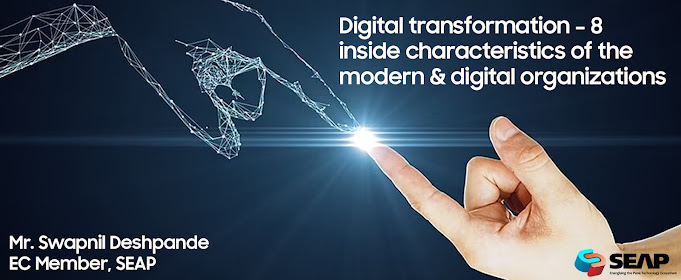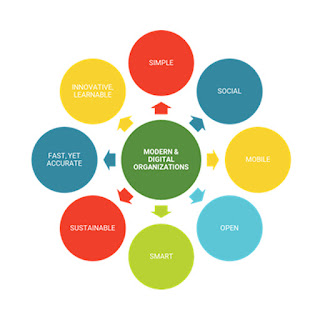The pandemic has changed the dynamics of almost every kind of business. And today, most businesses have no choice but to transform themselves through technology to reach their customers and continue their existence.
Digital transformation is not a new concept. Probably, it's one of the most overused terms in recent times, especially during the last couple of years. Every other company is either getting digitally transformed, or helping others get transformed, or both.
However, have you ever thought about what a ‘transformed’ organization looks like? What are the characteristics of a modern and a digitally transformed organization? How does a ‘Digitally transformed’ organization function and work, to continue the agility that they have gained through the transformation?
Here are 8 characteristics or principles of the ‘Modern and Digitally transformed’ organization. These principles define how these companies operate internally, how their employees and teams see the organization from inside.
Simple
For digitally transformed organizations, the size of the company does not matter for their IT operations. Whether the company size is 500 people, or 50,000 people, these companies do not find it hard to scale their internal operations and business processes.
The internal organization complexities are hidden behind simpler interfaces and intuitive business processes. They provide great working experiences to the employees, customers, and guests alike.
The access to their core systems and services are easily available to build better interfaces and experiences for their internal business operations and customer facing processes.
Mobile
Organization allows work from anywhere, any time and business processes are tuned and built to support remote first working culture. These organizations take advantage of the time zone aligned teams rather than limiting them to specific locations or regions.
The services that are offered to employees and customers are hyper personalized and they can take their experience anywhere they go and access services with any device.
Social
Digitally transformed organizations also transform the culture of the company. These organizations encourage collaboration and prefer networked conversations over structured conversations. Diversity and inclusiveness are key elements of the culture, and everyone’s opinions are important to take the organization forward.
Employees engage in natural and non-hierarchical communications across the organization, and they have necessary tools and technology at the disposal that allows them to communicate the way they want and improve social collaboration.
Open
The information is open, the organization culture promotes and actively demonstrates transparency into its operations and decisions. With this, the information becomes an enabler for people to do better work. Even with a culture of openness & transparency, security and privacy remain of paramount importance.
The core IT systems are easily interoperable, and the IT assets are easily discoverable and accessible through internal developer platform / API / core asset marketplaces.
Smart
These organizations integrate the physical workspaces with digital technologies to build smarter experiences for their employees, customers, and guests. They capture telemetry of every event happening within their digitized business process and ensure that they use big data to enhance their experience as well as the processes.
They use AI for enhancing human effectiveness at work and provide full or assisted decision support for key organizational decisions.
Sustainable
These organizations care about sustainability and environment and ensure that they run on sustainable energy and prioritize being carbon neutral (if not negative). They would have committed to and demonstrated actions on supporting the SBTi goals towards climate action.
For the assets and devices owned by the organization, they follow the eco-friendly recycling and promote reusability. Their cloud infrastructure runs on green cloud computing.
Fast, yet accurate
Digitally transformed organizations are highly data driven. They have trustworthy data, made available to employees and leaders through established data platforms and relevant tools. The data that people are entitled to access is available at fingertips, in the format the employees want.
All operational, business, and organizational decisions are driven by intelligent & actionable data insights.
Innovative, learnable
The digitally transformed organizations make innovation easy and take efforts to democratize innovation within the organization. Their next phase of growth is driven by innovation. They have lower barriers for innovation and experimentation and set clear paths for idea->impactful outcomes.
These organizations retain a high focus on research and continuous learning and people capability development. Employee growth & development is a core part of the organizational strategy & culture.
Final thoughts
Markets and customer needs are evolving fast, and technology is evolving even faster. In the new age of business, there is an inherent need for companies to stay ahead of others. Being a modern & digital organization gives companies an advantage in the competitive market to respond faster to changing customer needs.
While above 8 principles define the characteristics of the modern & digital organizations from inside (for employees & its leaders), it’s very important to know that being digital and modern is no end state, but it’s a continuous evolution. The companies who would wait and stay reactive, will be in a true danger of irrelevance, unless they act now, and act fast.
Being a modern & digital organization gives companies an advantage in the race, the relentless focus on customer success, being flexible and adaptable to customer needs and being continuously innovative towards building better / newer products and services for customers is what will define the success of these organizations.



No comments:
Post a Comment